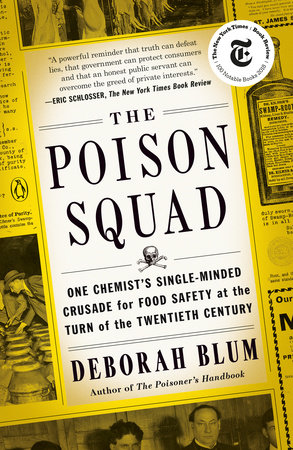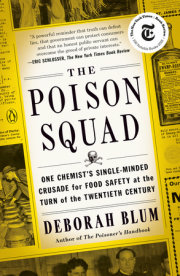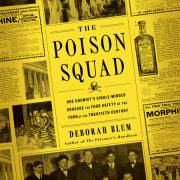Introduction
We tend these days to cast a romantic glow over the foods of our forefathers. In such rosy light, we may imagine grandparents or great-grandparents thriving happily-and solely-on farm-fresh produce and pasture-raised livestock. We may even believe that they ate and drank in a world untouched by the chemically enhanced and deceptive food manufacturing practices of today.
In this we would be wrong.
By the mid-nineteenth century, in fact, many foods and drinks sold in the United States had earned a reputation as often untrustworthy and occasionally downright dangerous.
Milk offers a stunning case in point. Dairymen, especially those serving crowded American cities in the nineteenth century, learned that there were profits to be made by skimming and watering down their product. The standard recipe was a pint of lukewarm water to every quart of milk-after the cream had been skimmed off. To improve the bluish look of the remaining liquid, milk producers learned to add whitening agents such as plaster of paris or chalk. Sometimes they added a dollop of molasses to give the liquid a more golden, creamy color. To mimic the expected layer of cream on top, they might also add a final squirt of something yellowish, occasionally pureed calf brains.
"Where are the police?" demanded New York journalist John Mullaly as he detailed such practices and worse in his 1853 book, The Milk Trade in New York and Vicinity. Mullaly's evidence included reports from frustrated physicians stating that thousands of children were killed in New York City every year by dirty (bacteria-laden) and deliberately tainted milk. His demands for prosecution were partly theater. Despite his and others' outraged demands for change, no laws existed to make such adulterations illegal. Still Mullaly continued to ask, when would enough be enough?
Fakery and adulteration ran rampant in other American products as well. "Honey" often proved to be thickened, colored corn syrup, and "vanilla" extract a mixture of alcohol and brown food coloring. "Strawberry" jam could be sweetened paste made from mashed apple peelings laced with grass seeds and dyed red. "Coffee" might be largely sawdust, or wheat, beans, beets, peas, and dandelion seeds, scorched black and ground to resemble the genuine article. Containers of "pepper," "cinnamon," or "nutmeg" were frequently laced with a cheaper filler material such as pulverized coconut shells, charred rope, or occasionally floor sweepings. "Flour" routinely contained crushed stone or gypsum as a cheap extender. Ground insects could be mixed into brown sugar, often without detection-their use linked to an unpleasant condition known as "grocer's itch."
By the end of the nineteenth century, the sweeping industrial revolution-and the rise of industrial chemistry-had also brought a host of new chemical additives and synthetic compounds into the food supply. Still unchecked by government regulation, basic safety testing, or even labeling requirements, food and drink manufacturers embraced the new materials with enthusiasm, mixing them into goods destined for the grocery store at sometimes lethal levels.
The most popular preservative for milk-a product prone to rot in an era that lacked effective refrigeration-was formaldehyde, its use adapted from the newest embalming practices of undertakers. Processors employed formaldehyde solutions-sold under innocuous names such as Preservaline-to restore decaying meats as well. Other popular preservatives included salicylic acid, a pharmaceutical compound, and borax, a mineral-based material best known as a cleaning product.
Food manufacturers also adopted new synthetic dyes, derived from coal by-products, to improve the color of their less appealing products. They found inexpensive synthetic compounds that they could secretly substitute into food and drink-saccharin to replace sugar; acetic acid instead of lemon juice; lab-created alcohols, dyed and flavored, to mimic aged whiskeys and fine wines. As progressive Wisconsin senator Robert M. La Follette described such practices in 1886: "Ingenuity, striking hands with cunning trickery, compounds a substance to counterfeit an article of food. It is made to look like something it is not; to taste and smell like something it is not; to sell something it is not, and so do deceive the purchaser."
No wonder, then, that when alarmed citizens began pushing for federal help in checking such fraud and fakery, they did so under the banner of purity. They saw themselves as "pure food" crusaders, fighting to clean up not only a contaminated supply chain but also a system that was dirty to its roots and protected by politicians friendly to industry. As Mullaly had done decades earlier, the new crusaders-scientists and journalists, state health officials and leaders of women's groups-loudly deplored their national government's willingness to allow such corrupt practices to continue.
The leaders of the pure-food movement united behind the idea that regulatory oversight was the only realistic answer. They'd seen many times that the country's food processors and manufacturers felt little or no responsibility to protect the food supply, especially if it meant reducing profits. Formaldehyde, for instance, had been directly linked to deaths-notably of children drinking what came to be called embalmed milk-without any move by producers to discontinue the preservative's use. The preservative's usefulness in salvaging bad milk-otherwise unsalable-was too valuable to lose.
American corporations had successfully and repeatedly blocked efforts to pass even modest food safety legislation. This especially galled consumer safety advocates because governments in Europe were enacting protective measures; some foods and drinks sold freely in the United States were now banned abroad. Unlike their American counterparts, European beer and wine makers were blocked from using risky preservatives in their beverages (although they could put them in products destined for U.S. sales).
At the first National Pure Food and Drug Congress, held in Washington, DC, in 1898, delegates noted that American food fraud had continued to flourish since La Follette's speech on the floor of the Senate some thirteen years earlier. How long would the country go without some policy or plan to deal with industrial food? No one knew. But surely, one delegate suggested hopefully, "this great country [must eventually] take its proper place among civilized nations and protect its citizens."
Many of the several hundred pure-food advocates at the congress saw their best chance for progress in what might have seemed an unlikely source of heroics: a small chemistry unit in the U.S. Department of Agriculture and its chief scientist, a middle-aged Indiana native who'd trained in chemistry at Harvard University.
But that was, in reality, a savvy choice.
Decades before the federal government had even considered anything resembling a food and drug administration, the Department of Agriculture (created in 1862 by President Abraham Lincoln) was tasked with analyzing the composition of American food and drink. It was the only agency to do so and that work was mostly in response to unhappy farmers who saw manufactured food undercutting their market. An 1870s complaint from a Minnesota agricultural association asked the division to investigate the "misapplication of science to deodorize rotten eggs, revive rancid butter, and dye pithy peas" green again.
But it wasn't until the Agriculture Department named Harvey Washington Wiley chief chemist in 1883-recruiting him from a job at Purdue University-that the agency began methodically investigating food and drink fraud. Although best known as an expert in sugar chemistry, Wiley had studied food fakery while still in Indiana and had warned then that "counterfeit" products could be considered a threat to public health. Upon arrival at the Agriculture Department, he promptly initiated a series of investigations of products ranging from butter to spices to wine and beer, building a detailed and sometimes horrifying portrait of the country's food supply. Those reports would lead him, in the early twentieth century, to test some of the most suspect chemical additives on human volunteers, a series of experiments dubbed the "Poison Squad" studies by the nation's newspapers.
His food and drink investigations-and the detailed criticism they contained-both infuriated manufacturers and alarmed Wiley's business-minded supervisors. But he refused, under pressure, to stop the studies. And as the pure-food advocates noted with admiration, Wiley stuck by his research-and his researchers-even when they reached conclusions that embarrassed powerful corporate and political interests.
Even worse, in the view of those interests, he publicized the findings. He steadfastly sought to inform not just government officials and lawmakers but also the public at large-including pure-food activists-about what his investigations revealed. The years of research findings, he told a congressional committee, had convinced him that polite resignation was unacceptable.
And Wiley tended to stand out anyway. He was a tall man, dark haired and dark eyed, imposing in stature, humorously charming in private, by turns ministerial and theatrical in public. He would become the best-known face of the national battle for food safety regulation at the turn of the twentieth century, building an alliance of consumer advocates and rallying them, in the face of repeated setbacks, to stay in the fight. He was America's first great food safety chemist, but his greatest contribution to the cause-even more than the scientific work he conducted and supervised, even more than his considerable ability to dramatize the cause-was "the inspired generalship he offered," wrote public-health historian Oscar Anderson Jr. Wiley, he added, "was the one leader who consistently saw the big picture," the long-term goal of strong consumer protection.
Wiley also had his imperfections. The son of a lay preacher, he tended to claim the moral high ground largely for his alliance alone. Faced with hostility, he became more rigid in his stance, often refusing to compromise even on small details. He quarreled over pictures on labels as firmly as he quarreled over toxic compounds in baked goods. His refusal to make nice, even when nitpicking, strained his alliances and, some felt, limited his effectiveness. He knew that too.
He failed, Wiley himself believed, to achieve the kind of fearlessly tough regulatory protections he wanted for his country. He could not forget or forgive the times that he'd stood up alone in-and sometimes lost-the fight against corporate interference in the law. His own criticisms of his grand achievement-the passage and enforcement of the landmark 1906 Pure Food and Drug Act-may well have undercut our perceptions of his accomplishments and caused us to undervalue his contributions.
But in that too we would be wrong.
Yes, we are still fighting for pure food. But let us recognize that we've come a wonderfully long way from the unregulated food, drink, and drug horrors of the nineteenth century. And in an era when business interests rail-as they did in Wiley's time-about government overreach and the need to eliminate regulations, we should remember how much Wiley's work laid the foundation that allows us to stand up to that. He changed the way we regulate, and he was essential in changing the way we think about food, health, and consumer protection.
It may not always serve us to cast a rosy glow over the past-or even over its heroes. But we should take care not to forget those early lessons on protecting our country-and ourselves. And as we look back to that first fierce battle for federal consumer protection, we would do well to remember what an intensely personal fight it often was. There's a remarkable and revealing story-one that illuminates where we stand today-behind the simple fact that what we now call the "pure food and drug law" was once known, coast to coast, as "Dr. Wiley's Law."
Part I
One
A Chemical Wilderness
1844-1887
We sit at a table delightfully spread
And teeming with good things to eat.
The sixth of seven children, Harvey Washington Wiley was born on April 16, 1844, in a log cabin on a small farm in Kent, Indiana, about a hundred miles northeast of the farm where Abraham Lincoln had grown up a few decades earlier.
The humble timber dwelling was an icon of authenticity for nineteenth-century Americans, particularly because Lincoln (born in adjacent Kentucky), as well as presidents such as Andrew Jackson and Zachary Taylor, had made their log-cabin beginnings a keystone of their respective political images. In later years Wiley liked to joke about his similarly modest origins. "I am not possessed with a common prejudice that a man must be born in a log cabin to attain greatness in the United States," he said.
But like those political luminaries, Wiley grew up working the land. By age six he was driving the family cows back to the barn for milking each day. At ten he was behind a plow. His father, Preston, was one of the first Indiana farmers to grow sorghum cane, and with curious son Harvey helping, the boy learned to boil down juice pressed from the grassy grain crop into a sweet syrup. That transformation helped spur his interest in food processing and in other types of sugars, one of the inspirations for his later career.
Preston Wiley had little schooling but valued learning, another strong influence on his second-youngest child. The father, who was a lay minister as well as a farmer, had even taught himself Greek. A fierce opponent of slavery-he made a point of gathering his children around for evening readings of the powerful abolitionist novel Uncle Tom's Cabin-farmer Wiley also believed in acting upon one's principles. Only three miles from the Ohio River, the family farm became Indiana's southernmost stop on the Underground Railroad. Escaped slaves from Kentucky, once they'd made it across the water, knew to seek out Preston Wiley. Under cover of darkness, he would escort them safely to the next stop, eight miles northward.
Harvey Wiley was preparing for college when the Civil War broke out, and his parents, despite their antislavery stance, were determined that he continue with it. He enrolled at nearby Hanover College in 1863 but a year later decided he could no longer sit out the war. After joining the 137th Indiana Infantry, he was deployed to Tennessee and Alabama, where he guarded Union-held railroad lines and spent his spare hours studying anatomy, reciting daily from a textbook to a fellow soldier. It was only a few months later that he and many of his fellows fell ill in a plague of measles sweeping through the camp. He was still ailing when his regiment returned to Indianapolis that September. He received a discharge, went home to recuperate, and then returned to Hanover, where he earned a bachelor's and then a master of arts degree in 1867. But he had by then, influenced by his army days, determined to become a physician. In his graduation address, he spoke of his then-chosen profession with typical over-the-top exuberance. The medical man, Wiley declaimed, "can not climb to Heaven and pull down immortality," but he can help achieve a longer life "full of health and happiness and hope."
To earn money for medical school, Wiley first taught Latin and Greek at a small Christian school in Indianapolis. He spent the following summer apprenticed to a country physician in Kentucky, then enrolled in Indiana Medical College, where he earned an MD, graduating in 1871. By that time, though, he'd learned that although he admired the work of medical practitioners, he did not enjoy caring for sick people. He accepted an offer to teach chemistry in the Indianapolis public high schools and there began to appreciate the insights offered by that branch of science or, as he came to see it, the "nobility and magnitude" of chemistry. Realizing he had a passion for the rapidly advancing field, he went back to school yet again, this time to study chemistry at Harvard University, which-as was typical at the time-awarded him a bachelor of science degree after only a few months of study. In 1874 he accepted a position at Indiana's newly opened Purdue University as its first (and only) chemistry professor.
Copyright © 2019 by Deborah Blum. All rights reserved. No part of this excerpt may be reproduced or reprinted without permission in writing from the publisher.










